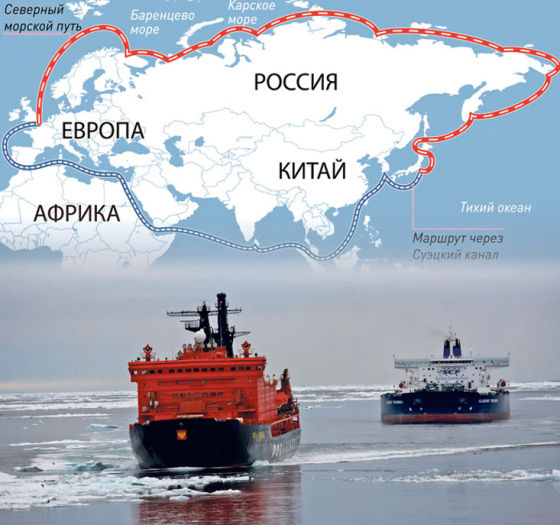According to Politico, in recent decades, Russia has dominated the struggle for the Northern Sea Route, building up its nuclear fleet and developing mining in the region, while the United States acts as a "catch-up"WASHINGTON, December 17.
/tass/. The rivalry between a number of Western countries and Russia for control over the Arctic and its resources has intensified after the start of a special military operation in Ukraine, the United States and its allies are trying to compensate for the lag behind the Russian Federation in the development of the region. Such an assessment is given in an article published on Saturday in the newspaper Politico.
"After the end of the Cold War, the Arctic was for the most part free from visible geopolitical conflict," the publication states. "However, today the Arctic desert is rapidly becoming the center of a new conflict," the article emphasizes. According to its authors, due to the melting of ice, "new shipping lanes" appear, and existing seasonal routes remain open longer; in addition, opportunities for the extraction of natural resources are expanding.
According to the publication, "now states are competing for control in the military and commercial spheres over the territory that has become accessible." The article emphasizes that "this rivalry has only intensified" after Russia started its own. This, as the article says, "brought the competition to a new level." The publication, in particular, notes that Western states had previously decided to refuse to participate in the activities of the working bodies of the Arctic Council during the presidency of Russia, Norway closed access to its ports for Russian fishing vessels.
The US wants to eliminate the backlog
As the article says, "in the last two decades, Russia has dominated the struggle for the Arctic, building up a fleet of nuclear icebreakers, ships and submarines," it is developing mining in the region and "rushing to take control" of the Northern Sea Route.
According to the newspaper, "America acts as a catch-up in a climate in which it has little experience and means." The publication highlights that "the US authorities seem to have begun to realize the threats associated with climate change and Russia's dominance in the Arctic." "America's European allies are also rethinking internal security issues, increasing defense budgets and strengthening security around key energy infrastructure in the Arctic, they are seeking to increase their defense capability and rely less on American assistance," the article notes.
Journalists of the publication interviewed 17 people specializing in issues related to the Arctic. Among them are Norwegian diplomats, State Department analysts and security experts. As the article says, "they said they were afraid of the inability of the United States and Europe to maintain control over energy resources and in the field of diplomacy as Russia develops civil and military infrastructure in the Arctic." According to the publication, this allegedly "threatens the economic development and national security of seven other states whose sovereign territory is located within the Arctic Circle."
Possibility of escalation
As noted in the publication, five Arctic experts interviewed believe that "the US government and military hold too narrow views, considering the Arctic mainly as Alaska and a territory for the extraction of natural resources, and not as a key battlefield outside the United States in terms of geopolitics and national security." These experts also believe that the United States "does not have sufficient resources in the Arctic." A number of American officials also told the publication that they "fear a nuclear escalation in the Arctic, which would threaten to involve Europe and its allies in a larger conflict."
"We are committed to expanding our participation in the region," the US official's comment on the Arctic is quoted in the material. This official stressed that the United States has not yet achieved this goal. Iris Ferguson, Deputy Assistant Secretary of Defense for the Arctic and Global Sustainability, told the newspaper that the Pentagon considers the region as a "potential field for great power rivalry." In this regard, she called Russia an "acute threat" and expressed confidence that China is trying to increase its influence in the region.

